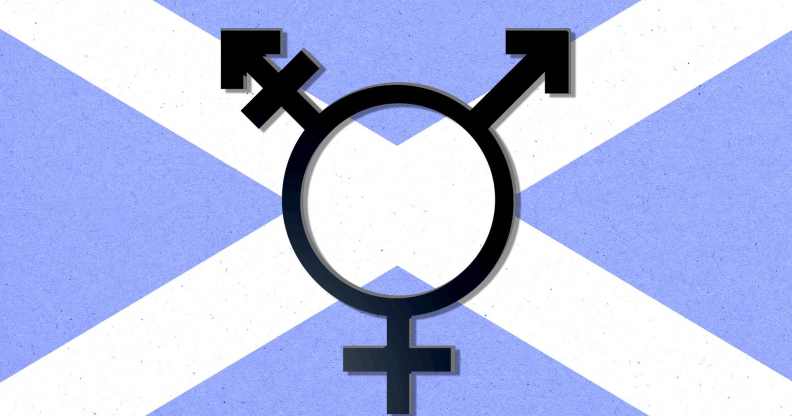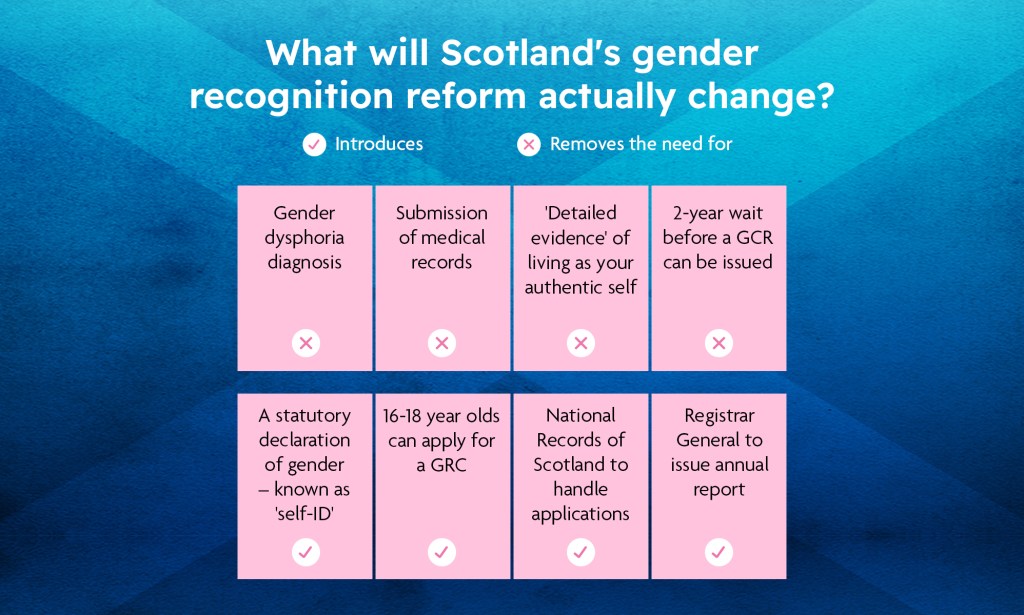What does Scotland’s gender recognition law change mean for trans people?

Scotland is poised to pass transformative gender law reforms. (Getty)
Scotland is poised to pass transformative gender law reforms. (Getty)
Holyrood has approved plans to simplify how trans people can change their gender on legal documents in Scotland, but the legislation is set to be blocked from becoming law by the Tory government in Westminster.
Scottish secretary in Westminster Alister Jack announced on Monday (16 January) that the UK government would block Scotland’s vital and long-overdue reform of its gender recognition laws – an unprecedented move described by Scotland’s first minister Nicola Sturgeon as a “full-frontal attack on democracy”.
The Scottish government introduced the Gender Recognition Reform (Scotland) bill after years of campaigning for changes to the Gender Recognition Act (GRA) to make the process by which people can update the sex on their birth certificates simpler and fairer. A final vote on Thursday (22 December) saw the reforms passed by 86-39 votes.
When the GRA was signed into law in 2004, it was a step in the right direction. But in recent years trans people, human rights advocates and equality organisations have criticised the system as being too difficult to access.
There have been calls for years for the Tory government to reform the GRA in line with international best practices and make it easier for trans people to obtain a gender recognition certificate – the legal recognition of their gender – but promised UK-wide reforms have been ditched.
In March, Scotland’s government introduced a bill of its own to reform the law, which would significantly improve and streamline the current process. The legislation received widespread support from campaigners, the Scottish people and every part of Holyrood, barring the Scottish Tories.
The legislation predictably garnered intense opposition from conservatives and anti-trans groups, who wrongly believe the reform would infringe on women’s rights. This has led to misinformation spreading about what the legislation would actually means for trans people in Scotland.
What is the UK’s current gender recognition system like for trans people?
At present, trans people in the UK must apply to a gender recognition panel and present a diagnosis of gender dysphoria – a laborious process that can take years due to the incredibly long wait times at NHS gender clinics. People can only apply to be legally recognised as male or female – non-binary genders are not legally recognised in the UK.
Applicants must provide two medical reports, and at least one needs to include details of any gender-affirming treatments or healthcare the individual plans to have. It also needs to confirm a diagnosis of gender dysphoria.
The individual must also prove they’ve lived in their “acquired” gender for at least two years, and they must swear they intend to do so for the rest of their lives. This can include evidence showing they’ve used a different name in official documents or changed their gender on their driving license or passport.
What changes are in the Gender Recognition Reform (Scotland) bill?
The Scottish government argued that the current process is too invasive and causes distress to trans people, who face marginalisation and stigmatisation.
The Gender Recognition Reform (Scotland) bill makes it easier for trans people to obtain a GRC and see applications handled by the country’s registrar general – rather than the UK panel.
It will also do away with the required gender dysphoria diagnosis or medical reports. The legislation lowers the minimum age that someone can apply from 18 to 16.

Additionally, the period in which applicants need to have lived in their acquired gender will be cut to three months or six months for people aged 16 and 17. There is also a new requirement of a “waiting period” of three months after applying when an individual must reconfirm their wish to receive the GRC.
It will no longer be a requirement to submit detailed evidence of the individual living as the other gender.
Trans people wanting to change their legal gender will still need to swear an oath about remaining as their authentic gender for life, and it will continue to be a criminal offence to knowingly make a false application for a GRC.
The registrar general will also report annually on the number of applications made and GRCs issued in Scotland.

Why is the Gender Recognition Reform (Scotland) bill so important?
These changes significantly improve the existing process trans people can have their gender legally recognised in Scotland, and remove the barriers many trans people face to accessing their legal right to gender recognition.
Vic Valentine, manager of Scottish Trans, explained that everyone wants to be “able to be true to ourselves and have that accepted and supported by our friends, family and communities”.
Valentine noted the “unfair process for changing the sex recorded” on birth certificates.
“This means that at important moments in our life – like starting college or a new job, or when getting married – we have to show a document that doesn’t reflect who we truly are,” Valentine said.
The advocate added voting in favour of the bill is an opportunity for MSPs to have a “positive impact on the lives of trans people across Scotland”, supporting their “freedom to live as [their] true selves”.
So why are people opposed to legislation that would improve the lives of trans people?
Sadly and predictably, the Gender Recognition Reform (Scotland) bill has garnered criticism from anti-trans groups and conservative MSPs despite the measure just improving a system that already existed.
Some opponents argue reforming the GRA could lead to the removal of single-sex services or women-only spaces – prompting the rise of anti-trans rhetoric and widespread misinformation about what the reform actually does.
However, these spaces are protected separately through the Equality Act 2010, and the Equality and Human Rights Commission published guidance in April that essentially was a how-to guide on how to exclude trans people from such providers.
Prime minister Rishi Sunak, who said he doesn’t think trans women are women, has reportedly expressed interest in removing legal protections for trans people from the Equality Act by making it “clear that sex means biological sex rather than gender”.
When will the changes in the Gender Recognition Reform (Scotland) bill be implemented?
The Gender Recognition Reform (Scotland) bill has been passed by the Scottish parliament but is set to be blocked form becoming law by the Tory government in Westminster – a decision that could be challenged by Scotland’s government in court.
Scottish secretary Alister Jack announced on Monday (16 January) that for the first time in the history of the Scottish parliament, a Section 35 order under the Scotland Act will be used to prevent the Scottish bill from becoming law.
Following the announcement, Scottish first minister Nicola Sturgeon tweeted that “the Scottish government will defend the legislation and stand up for Scotland’s parliament”.
Should the Scottish government challenge and successfully defeat the UK government’s attempt to block the legislation, the bill would go into an implementation process where the Scottish government works to develop the new systems created by the bill. It’s projected this could take about a year.

